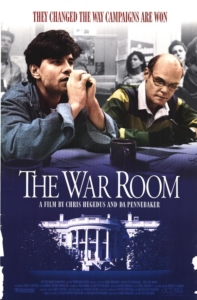 The War Room, dir. D. A. Pennebaker and Chris Hegedus
The War Room, dir. D. A. Pennebaker and Chris Hegedus
Last year Criterion re-released the 1993 film The War Room in coordination with the twentieth anniversary of Bill Clinton’s first presidential campaign. The film, directed by D.A. Pennebaker and Chris Hegedus, follows Clinton’s campaign for the White House and the title refers to the nickname given to his strategy sessions. Clinton himself plays a pretty small role in The War Room, which mostly centers on the partnership between the campaign’s lead strategist James Carville and communications director George Stephanopolous. Both now work in the media, playing up reputations established during the Clinton administration—Carville, popularly known as the Ragin’ Cajun, throws political shade on CNN, while Stephanopolous is clean-cut and even-keeled on Good Morning America. The War Room catches them before they had hewn personas, when they were just raw personalities. The film is an insightful and rare — probably exclusive — portrait of the people who engineer political victory.
Carville’s shining moments in the film are scenes of him scheming, stirring up trouble for opponents, giddy with mischief. He’s also a virtuosic rhetorician, scripting characteristically cheeky one-liners for Clinton and ad-libbing pitch-perfect speeches. Stephanopolous, for his part, is cool and composed, demonstrating an astounding gift for damage control. In one scene Stephanopolous talks a Democrat working on the Ross Perot campaign out of contacting the press regarding an alleged Clinton sex scandal. Looking relaxed in a jean jacket, Stephanopolous tells the would-be informer, “Think of yourself… The alternative is that you don’t do it, it causes you some temporary pain with people who tomorrow aren’t going to matter, and you have a campaign that understands that in a difficult time you did something right.”
The War Room doesn’t meet the criteria for either of the public’s two favorite political narratives: it’s not a condemnation of cutthroat, dirty, morally debased politics, and it’s also not a story about the golden-hearted overcoming adversity with righteous conviction. Clinton’s people are neither sharks nor saints, they’re wonks. And wonks don’t get off on ideology or power; they get off on strategy. They’re like gamers at the console, who value fresh obstacles and sweet, temporary triumphs over big-picture achievement.
Apparently George Clooney made his cast watch The War Room in preparation for his recent campaign movie Ides of March, but it looks like they missed the point. Ides of March is about backstabbing conspiracy and serpentine power grabs, the naive idealism of its young protagonist eventually smothered by the ruthlessness of more seasoned political insiders. This kind of cultural production, though it satisfies a justifiable mistrust of mainstream politics, fails to grasp something crucial about the people behind the scenes — it was never rosy idealism that propelled them to begin with, but delirious enthusiasm for the game.
 Desire/Love by Lauren Berlant
Desire/Love by Lauren Berlant
Theories of love are theories lived. Questions of who, what, when, where, why, and how — Who to pursue? What to wear? When to speak? Where to touch? Why flowers? How gently? — are always brushing up against the practical matters of lived experience. At least in my own case, these matters are not relegated to a realm of unthinking passion; they can be and often are discoursed in endless permutations with friends, family members, lovers, ex-lovers, strangers, pets, and a multitude of inanimate objects. The desire to love well drives a desire to know more, and that’s why there are books to tell you how. In a world where romantic success is often thought to trump professional success, books on how to influence people and make millions are often pressed passionately up against books on how to love, advice often cross-pollinating between them in the dark back corner of the bookstore.
Lauren Berlant’s Desire/Love is not one of these books. Rather than setting out to explain or explain away the complexities of desire, the novella length text from the Dead Letter Office imprint of Punctum Books — dedicated to publishing the unfinishable work that accumulates at the bottoms of drawers and the interstices of filing cabinets — maps a number of often incommensurate ways of thinking about these topics.
Originally written as a set of entries to a reference collection on critical terms in gender theory, Desire/Love is not a revelatory text. Nor is it meant to be. As Berlant writes, “When it comes to gender and sexuality there are no introductions, even if that is what this book seeks to be. There are only reintroductions.” In this sense, Desire/Love holds a mirror up to experience, reminding one of what is already there. Centrally, Berlant’s thesis is a reminder that the “love plot” which dominates popular media and therapeutic culture, with its promise of an ideal love that will erase the barriers between oneself and one’s beloved and lead to a happy, more simple life, suppresses the complex reality of “love’s awkward synchrony.” Love, for Berlant, is much more ambivalent than conventional accounts would have it, shimmering with tensions between the concerns of private and public life, the longings for individuality and unity, and the urges to preserve and consume. And the directions desire leads us are always mediated by conventions of propriety, which render certain desires acceptable and others not so much. Berlant illustrates this type of desire with the image of a rubber duck in a tub of water, bobbing and weaving, always just out of reach, always threatening to lead you forward into a plunge.
For those who are skeptical of psychoanalytic theory, the discussion of Freud, Lacan, “polymorphous perversity,” and “libidinous drives” peppered throughout may be something of a turn-off. I admit my own reservations on this account. But much more than demanding an adherence to any particular theory, Desire/Love encourages readers to acknowledge the impact that these theories and institutions have had in Western society in shaping collective understandings and experiences of sexuality as a central aspect of the story of what a person is and how one might achieve happiness.
While Berlant provides far more questions than she does answers regarding this struggle for romantic success, her looping theorizations prove far more titillating than any how-to guide ever is — I finished the entire thing over the course of an afternoon. And like the love advice you get from your potted plant, Desire/Love is free.
This post may contain affiliate links.








